Fifth Third Bank does not provide any CSV or bank feeds for their bank statements. They only send out PDF or paper bank statements.
Manually typing each transaction into a spreadsheet is not only time-consuming but also prone to errors. When your workload grows, this process becomes unsustainable, often requiring costly additional staff to manage.
The solution for this problem? Automating the conversion process.
In this article, we’ll guide you on how to convert Fifth Third Bank bank statement to Excel, CSV, or QBO formats and the benefits of using a bank statement converter.
Step 1: Upload Fifth Third Bank Bank Statement to DocuClipper
Begin by logging into your DocuClipper account to start the conversion process. If you’re a new user, take advantage of the free trial to get started. Once logged in, go to the “bank and credit card statements” section, and click “convert”
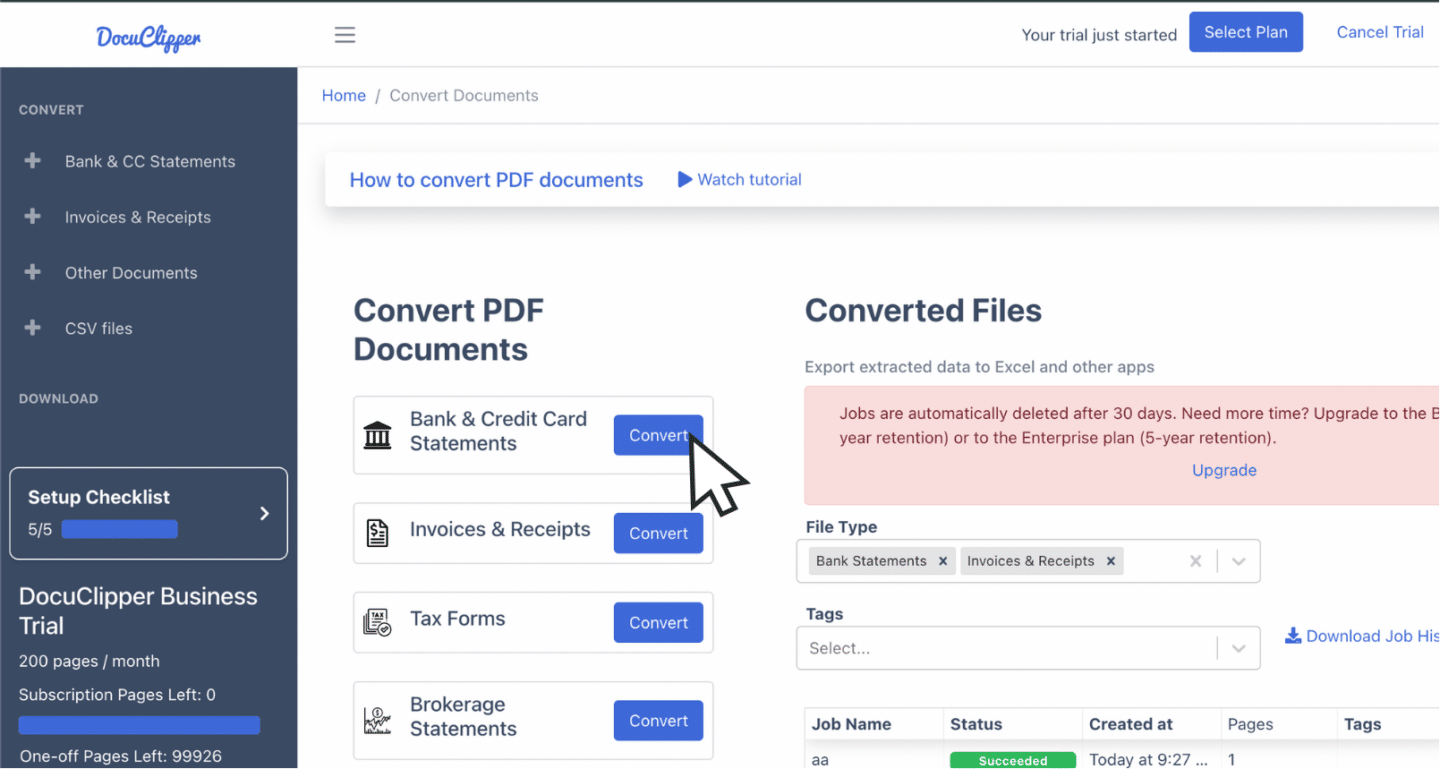
To upload your Fifth Third Bank PDF statements, simply drag and drop your files into the upload area. You can even upload multiple statements at once for faster processing. Adding tags or custom names to your files makes them more organized.
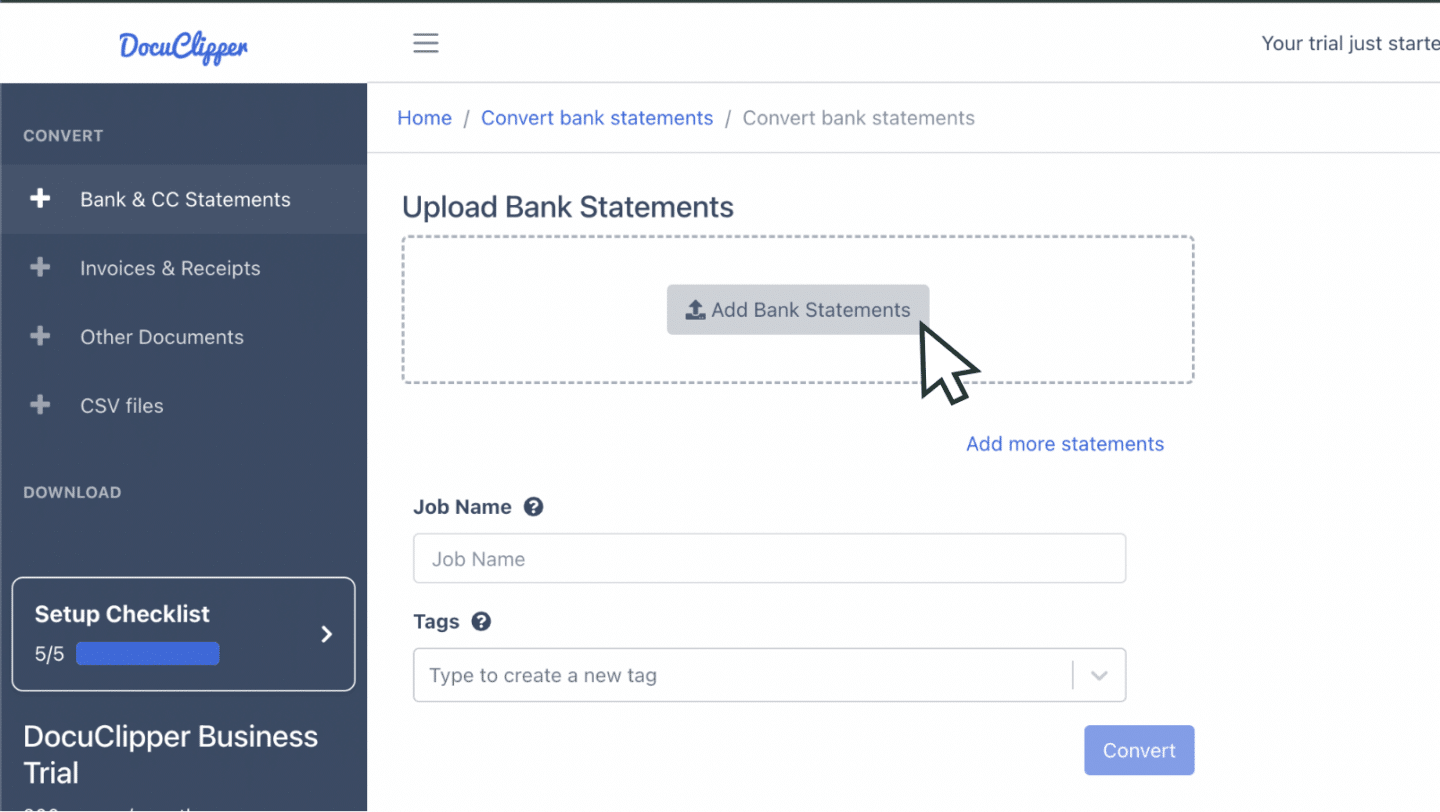
Another option is to email your statements directly to your unique DocuClipper email address (available in the settings). These files will then appear in your “Converted Files” section, ready for bank statement conversion into Excel, CSV, or QBO formats.
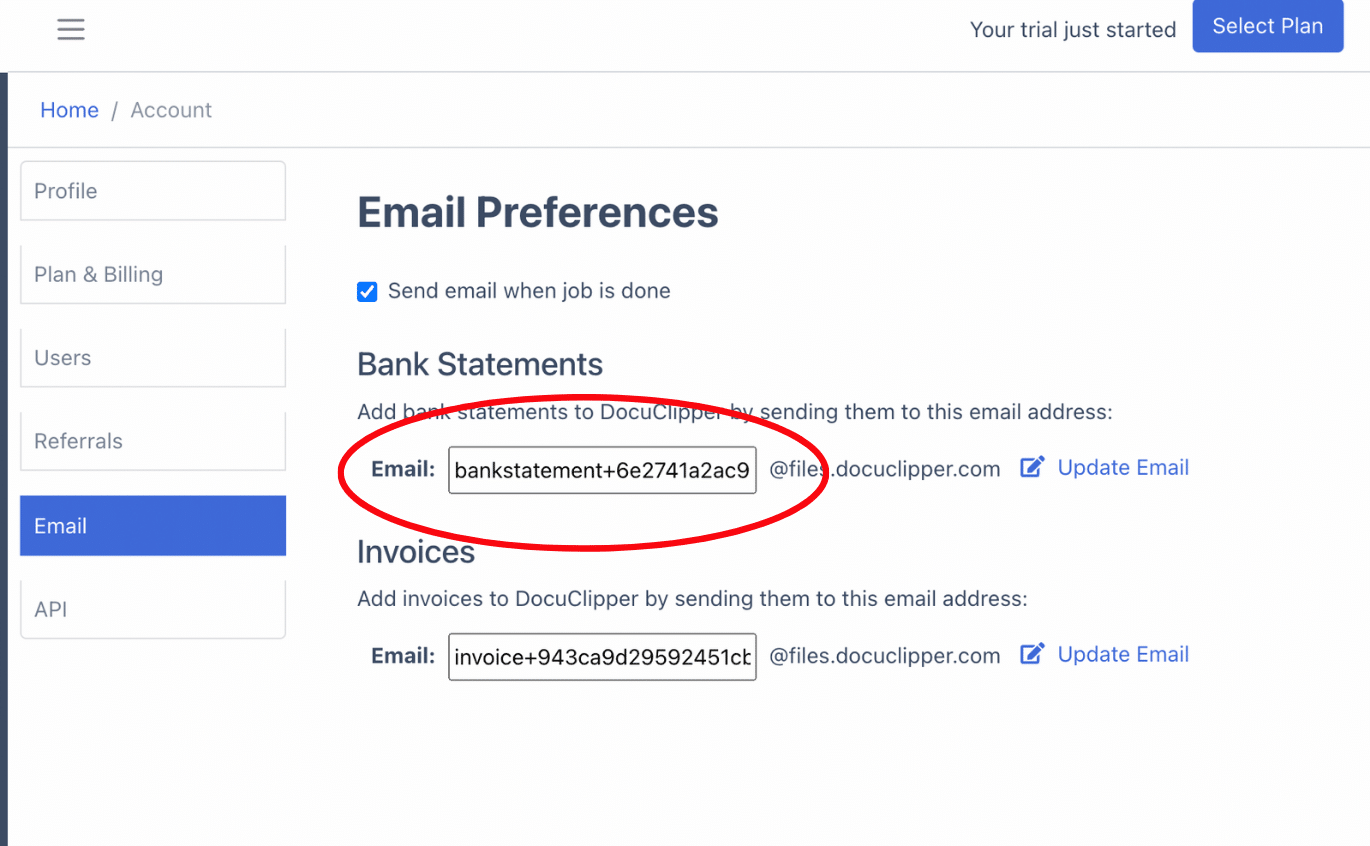
Step 2: Analyze Fifth Third Bank Bank Statement
Once your Fifth Third Bank statement is uploaded, the tool presents your original PDF alongside the extracted data in a spreadsheet format. This side-by-side view makes it easy to verify each bank transaction and spot any discrepancies in amounts, dates, or totals early in the process.
If you’re working with scanned paper statements, carefully inspect the extracted data for any potential scanning errors to ensure accuracy.
This review step is essential for maintaining reliable data before moving on to reconciliation or exporting.
Step 3: Reconcile Fifth Third Bank Bank Statements
After reviewing your Fifth Third Bank statement, the tool will automatically reconcile the bank statement transactions. If any discrepancies are identified, the reconciliation process of the bank statement will be flagged as incomplete, allowing you to address the issues.
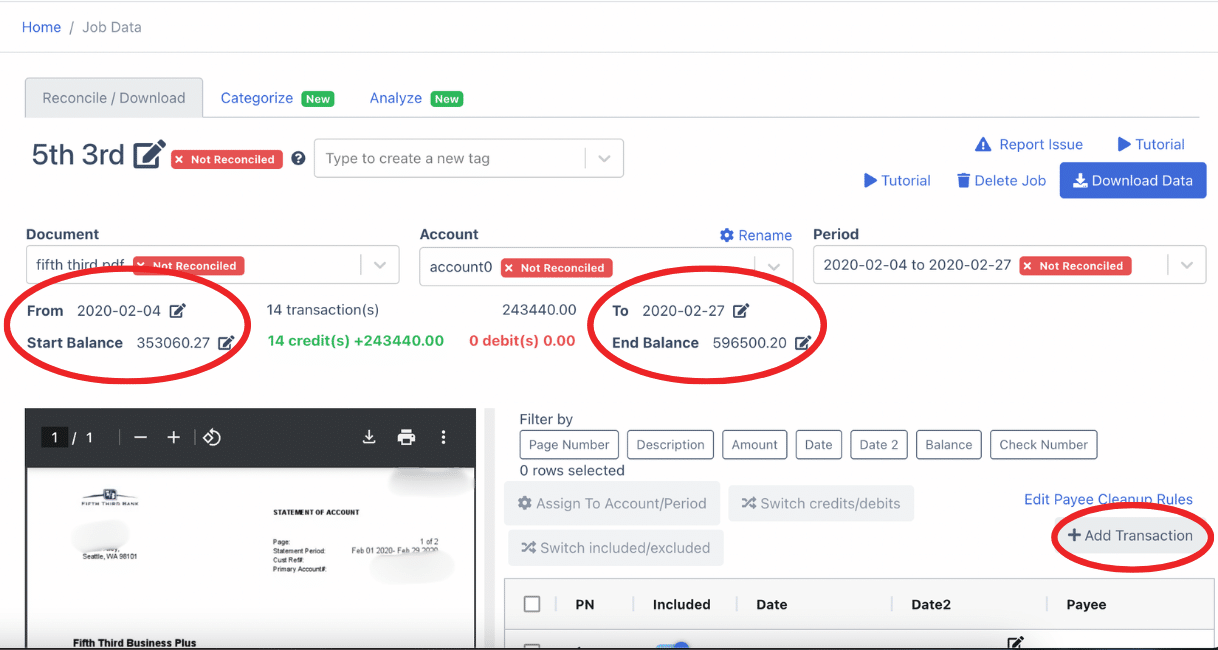
To resolve these, adjust transaction details such as amounts, dates, or descriptions by selecting the corresponding entry.
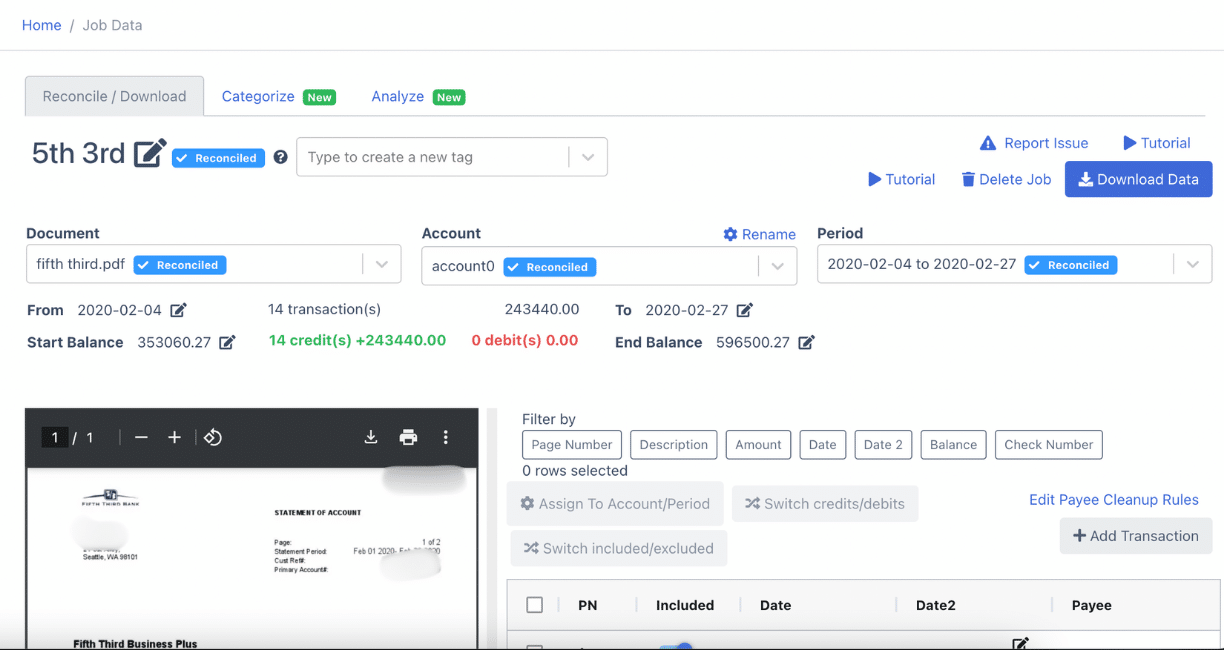
For missing transactions, simply add them manually by clicking “Add Transaction” and filling in the necessary details. Ensure that all credits and debits are accurately categorized to maintain clean and reliable financial records.
Step 4 Export Fifth Third Bank Bank Statement to Excel, CSV, QBO
With your Fifth Third Bank bank statement reconciled, you’re ready to export it to Excel, CSV, or QBO. Simply click “Download” and select your preferred format to begin the export.
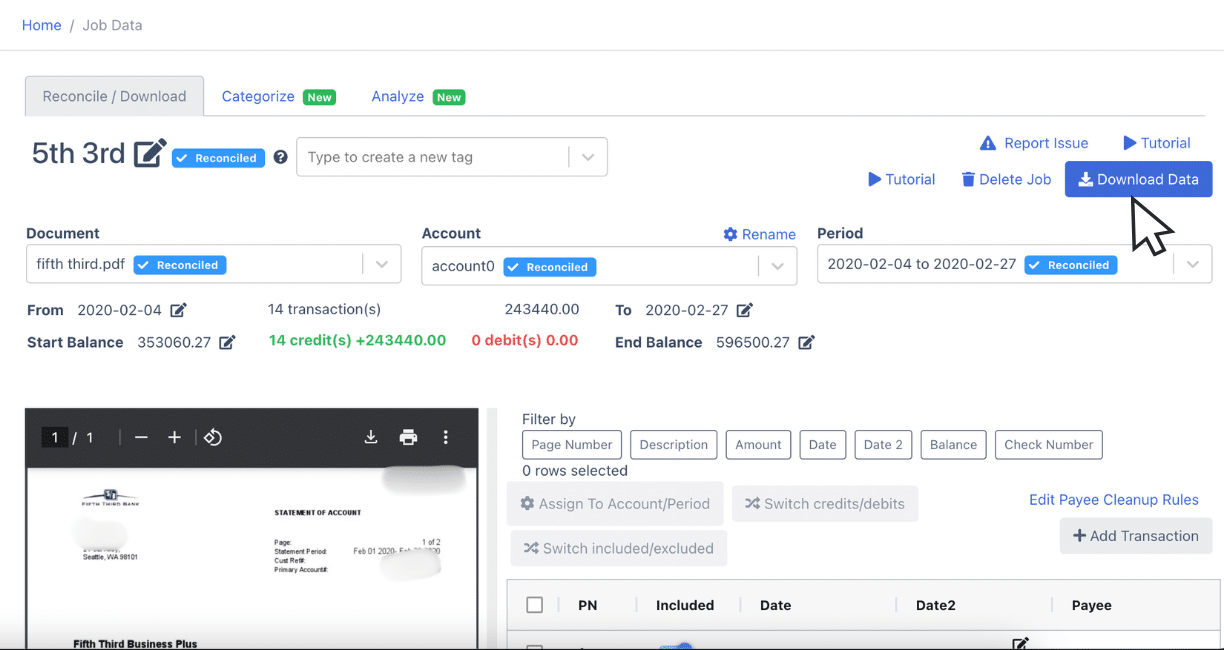
Export Fifth Third Bank Bank Statement to Excel
To export your Fifth Third Bank statement as an Excel file, access the export menu and select “Excel” from the options. Choose the “XLSX” file format to ensure compatibility with most spreadsheet applications.
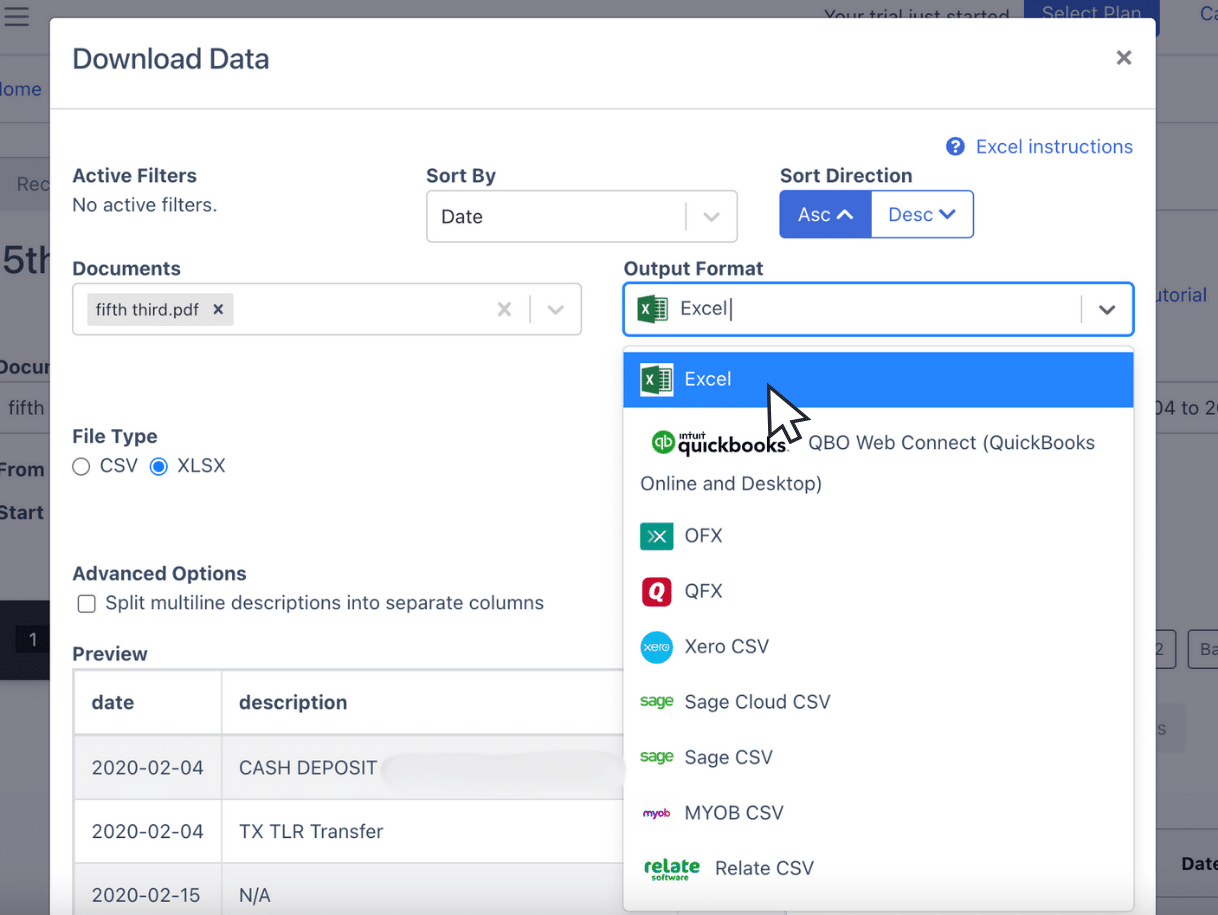
Once selected, click “Download,” and the file will be saved directly to your Downloads folder, ready for use in your accounting tasks.
Export Fifth Third Bank Bank Statement to CSV
To export your Fifth Third Bank statement in CSV format, which is widely compatible with accounting software, open the export menu and select “Excel.” Click the CSV button for the file format.
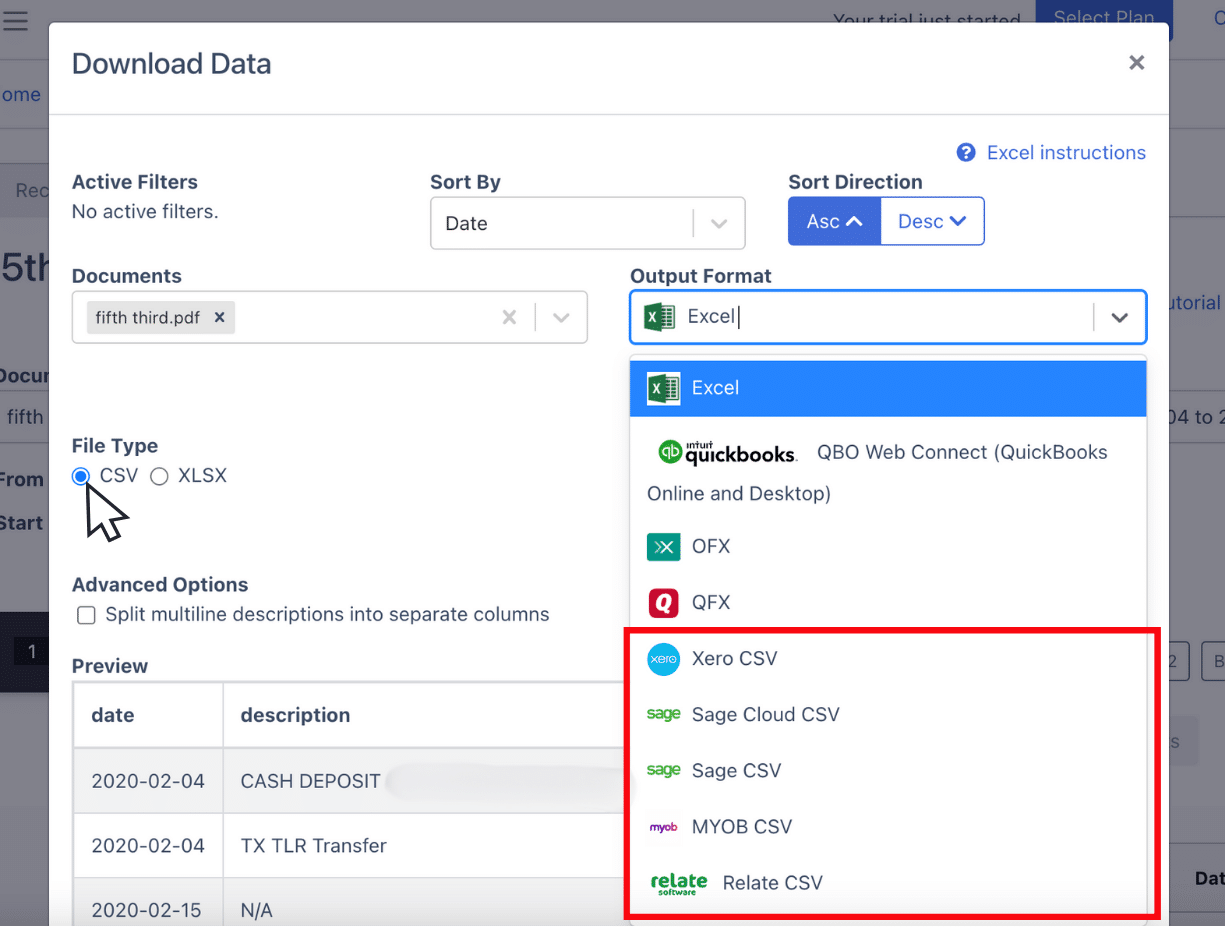
There are CSV formats also that are compatible with software like Quicken, Xero, Sage, MYOB, Relate, and NetSuite, allowing for efficient data transfer and streamlined accounting processes. Once selected, click “Download” to save your file.
Export Fifth Third Bank Bank Statement to QBO
For QuickBooks users, exporting your Fifth Third Bank statement in QBO format ensures a smooth import into the software.
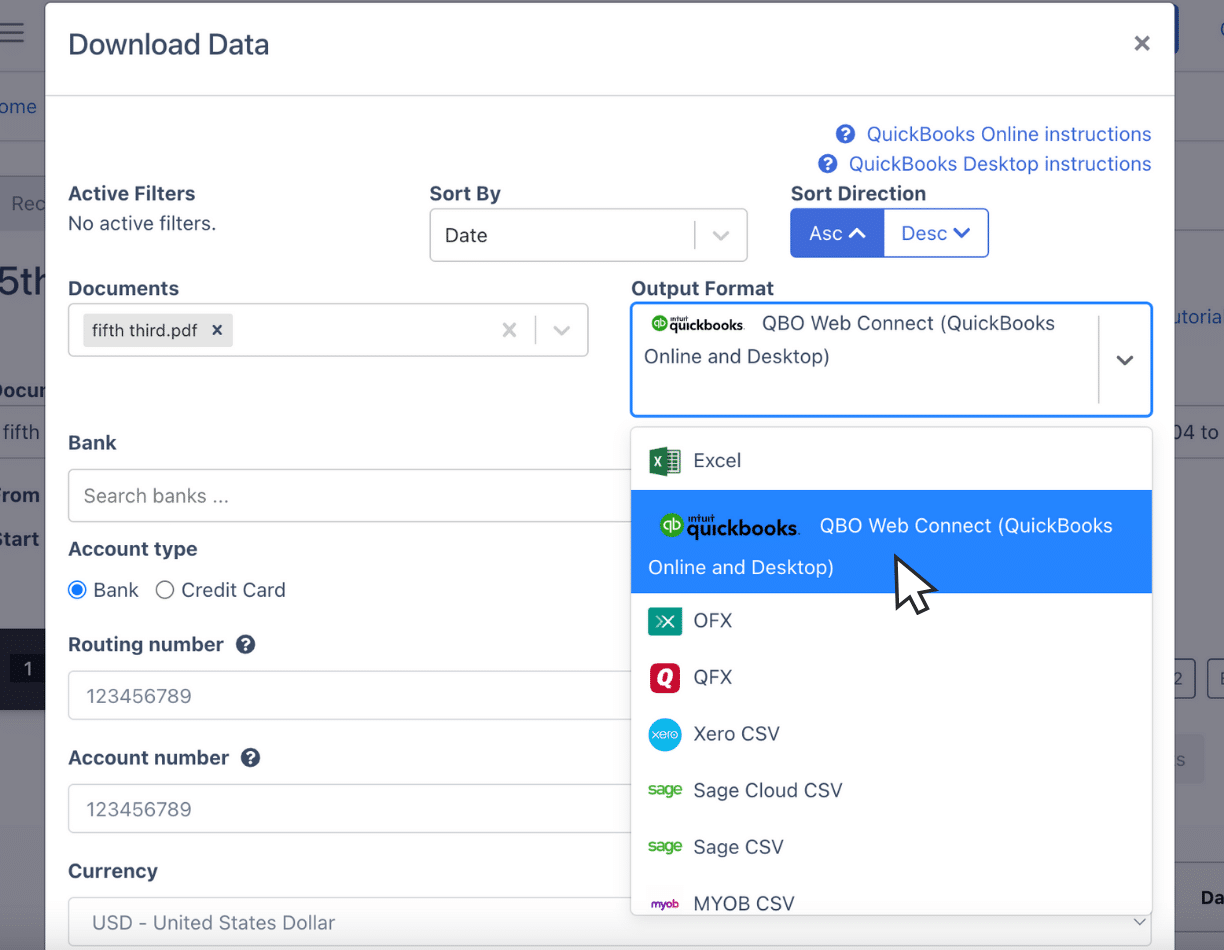
Open the export menu, choose “QBO,” and complete the necessary fields, such as bank account numbers, account names, or classifications.
Once the details are filled out, click “Download” to save the file. Your statement will now be ready for seamless import into QuickBooks, streamlining your accounting and reconciliation processes.
Also, we have more guides on how to import bank statements into different software:
- Import bank statements into QuickBooks
- Import bank statements into Sage
- Import bank statements into Xero
- Import bank statements into NetSuite
Step 5: Configure the Output Format
Before downloading your Fifth Third Bank statement, take a moment to review the spreadsheet’s output format. Ensure it aligns with your specific needs by adjusting settings like date formats, column order, or other details.
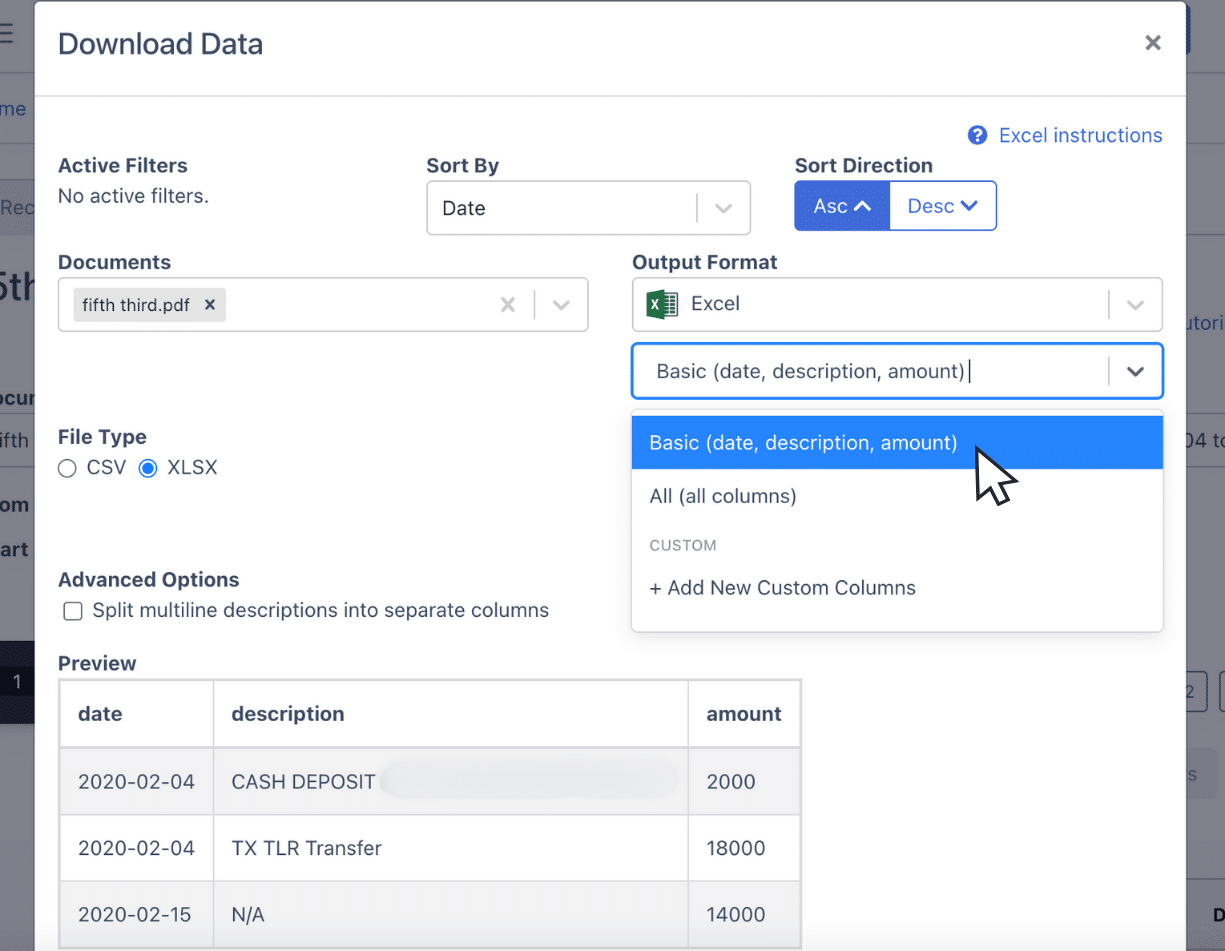
If further customization is required, use the “Customize” option to modify the default layout. This feature allows you to customize the output to match your accounting requirements.
How to Download Fifth Third Bank Bank Statements
To download your PDF Fifth Third Bank statements, follow these steps:
- Log In to Online Banking: Visit 53.com and enter your User ID and password to access your account.
- Navigate to Your Account: Once logged in, select the specific account for which you want to view statements.
- Access Statements: Within the account details, locate and click on the “Statements” tab to view available statements.
- Select a Statement: Choose the desired statement by clicking on its date or description.
- Download the Statement: After opening the statement, click the “Download” button to save it to your device.
Final Advice
Banks often provide statements in limited formats like bank feeds or CSV, leaving accountants to deal with piles of PDFs. As these accumulate, manually processing each bank statement becomes time-consuming and prone to errors, especially during busy periods.
Using DocuClipper solves this problem by transforming PDFs into usable formats like Excel, CSV, or QBO. This saves time, minimizes mistakes, and boosts productivity.
By automating these tedious tasks, you can focus on high-value accounting work, improving efficiency while reducing costs.
Why Use DocuClipper to Convert Fifth Third Bank Statements
DocuClipper is a web-based tool designed to convert PDF bank statements into formats like XLS, CSV, and QBO. By using advanced OCR technology, it accurately extracts data fields from bank statements, reducing manual entry errors.
It integrates well with popular accounting software such as QuickBooks, Sage, and Xero, ensuring smooth data transfer and management.
Additionally, DocuClipper’s transaction categorization feature organizes transactions into groups, streamlining financial analysis.
DocuClipper can also process credit card statements, brokerage statements, receipts, and invoices, making it a versatile solution for comprehensive financial document management.
FAQs About How to Convert Fifth Third Bank Bank Statement to Excel
Here are some frequently asked questions about how to convert Fifth Third Bank bank statements to Excel:
Can I export my Fifth Third Bank bank statement to Excel?
Yes, you can export your Fifth Third Bank statement to Excel using DocuClipper. Simply upload your PDF statement, review the data, and export it in Excel format. This ensures accurate, organized data ready for analysis or integration with accounting software like QuickBooks or Xero.
How do I download a Fifth Third Bank bank statement to a CSV file?
You can download a Fifth Third Bank statement as a PDF from online banking, then use DocuClipper to transform it into a CSV file. Upload the PDF, review the data, and export it in CSV format for compatibility with most accounting software.
How do I export a Fifth Third Bank bank statement to Excel?
To export a Fifth Third Bank statement to Excel, download the statement as a PDF from online banking. Use DocuClipper to upload the PDF, verify the data, and export it in Excel (XLSX) format for accurate and organized financial management.
Learn More
Looking for more types of bank statements to convert? Check out our library about bank statement conversion:
- How to Convert RBC Bank Statement to Excel, CSV, and QBO in 1 Minute or Less
- How to Convert Capital One Bank Statement to Excel, CSV, and QBO in 1 Minute or Less
- How to Convert US Bank Bank Statement to Excel, CSV, and QBO in 1 Minute or Less
Or use these resources to learn more about accounting:



